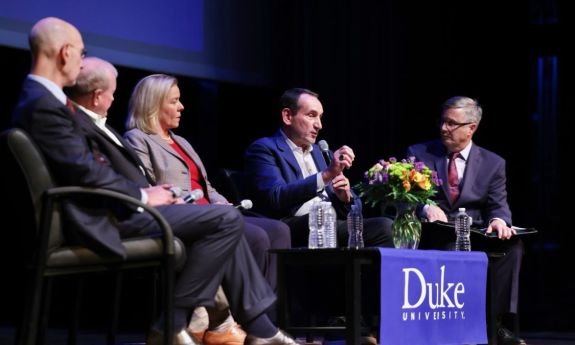Do Sports Belong in Diplomacy? What Leaders from the NBA, Olympics and College Think

Added Krzyzewski: “There's an amazing amount of respect (among players). And when they show that respect, (it’s) an example of maybe what we can do at different levels between those countries. That's why I think sports are so very, very important.”
Silver earned a bachelor’s degree from Duke in 1984. He was appointed NBA commissioner in 2014 and presides over a global sports and media organization built around five professional sports leagues: the NBA, WNBA, NBA G League, NBA 2K League and Basketball Africa League.
“We take these basketball programs all around the world, that we’re embraced everywhere, essentially, friends and foes, because there is this sense that we're coming in peace, that these are universal values, that through a sport like basketball, but it could be many other sports,” Silver said. “We're teaching values that every country seems to care about, that is teamwork, respect, hard work, etc.”
“We take these basketball programs all around the world, that we’re embraced everywhere, essentially, friends and foes, because there is this sense that we're coming in peace, that these are universal values, that through a sport like basketball, but it could be many other sports. We're teaching values that every country seems to care about, that is teamwork, respect, hard work, etc.”
Adam Silver
Asked about the value of sports boycotts, Dempsey estimated that there is no proof the six varied boycotts in Olympic history achieved their goals.
“It’s the athlete that fundamentally suffers … and I don't think anyone has ever been able to prove that a boycott makes any difference,” said Dempsey, who earned a master’s degree in literature from Duke in 1984. He now teaches leadership and public policy as a Rubenstein Fellow at Duke and serves as chairman of USA Basketball.
“Are politics and sports inextricably linked? In ways, yes. But can sport transcend and rise above politics? I'd like to believe the answer to that is yes.”
Sarah Hirshland
“And so my judgment is be in the game. And while you're in the game, represent yourself, your values, your country. …”
Added Hirshland: “Our country is the leader in sport around the world and the influence we have is palpable everywhere you go. So, are politics and sports inextricably linked? In ways, yes. But can sport transcend and rise above politics? I'd like to believe the answer to that is yes.”
The panelists also talked about the value they’ve seen when members of the military and athletes meet and experience their shared passion for representing their country and team with excellence, particularly the Olympic basketball teams Krzyzewski coached.
“We had the soldiers tear the Velcro flag off of their uniform and close ranks with the athletes and give them that flag and say, ‘This is it, this is what you're going to do. We do it every day,’” Dempsey said.
Silver said that while he doesn’t think politics should “invade the competition,” sports and politics are linked.
“I don't know if I’d use the word naive, but I don't think you can separate politics from sports. And I don't necessarily think that's a bad thing. … I think it's part and parcel of life,” he said. “And it doesn't mean that we shouldn't be drawing lines at certain times. We certainly do. … But I think at the same time, we're proud of the fact that our athletes … are comfortable with, regardless of where they're from in the world, speaking out about things that are important to them.
“And I also think that it doesn't necessarily mean that as a fan, you have to accept what they're saying. But I think that it's a healthy dialogue, engaging with them understanding their perspective, particularly on a global stage.”